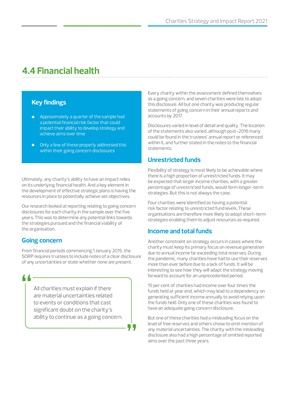
Decoding the Charity Governance Code
Charities Strategy and Impact Report 2021
4.4 Financial health
Key findings
Approximately a quarter of the sample had
a potential financial risk factor that could
impact their ability to develop strategy and
achieve aims over time
Only a few of these properly addressed this
within their going concern disclosures
Ultimately, any charity's ability to have an impact relies
on its underlying financial health. And a key element in
the development of effective strategic plans is having the
resources in place to potentially achieve set objectives.
Our research looked at reporting relating to going concern
disclosures for each charity in the sample over the five
years. This was to determine any potential links towards
the strategies pursued and the financial viability of
the organisation.
Going concern
From financial periods commencing 1 January 2015, the
SORP requires trustees to include notes of a clear disclosure
of any uncertainties or state whether none are present.
Every charity within the assessment defined themselves
as a going concern, and seven charities were late to adopt
this disclosure. All but one charity was producing regular
statements of going concern in their annual reports and
accounts by 2017.
Disclosures varied in level of detail and quality. The location
of the statements also varied, although post-2016 many
could be found in the trustees' annual report or referenced
within it, and further stated in the notes to the financial
statements.
Unrestricted funds
Flexibility of strategy is most likely to be achievable where
there is a high proportion of unrestricted funds. It may
be expected that larger income charities, with a greater
percentage of unrestricted funds, would form longer-term
strategies. But this is not always the case.
Four charities were identified as having a potential
risk factor relating to unrestricted fund levels. These
organisations are therefore more likely to adopt short-term
strategies enabling them to adjust resources as required.
Income and total funds
Another constraint on strategy occurs in cases where the
charity must keep its primary focus on revenue generation
due to annual income far exceeding total reserves. During
the pandemic, many charities have had to use their reserves
more than ever before due to a lack of funds. It will be
interesting to see how they will adapt the strategy moving
forward to account for an unprecedented period.
15 per cent of charities had income over four times the
funds held at year end, which may lead to a dependency on
generating sufficient income annually to avoid relying upon
the funds held. Only one of these charities was found to
have an adequate going concern disclosure.
But one of these charities had a misleading focus on the
level of free reserves and others chose to omit mention of
any material uncertainties. The charity with the misleading
disclosure also had a high percentage of omitted reported
aims over the past three years.
All charities must explain if there
are material uncertainties related
to events or conditions that cast
significant doubt on the charity's
ability to continue as a going concern.
"
"